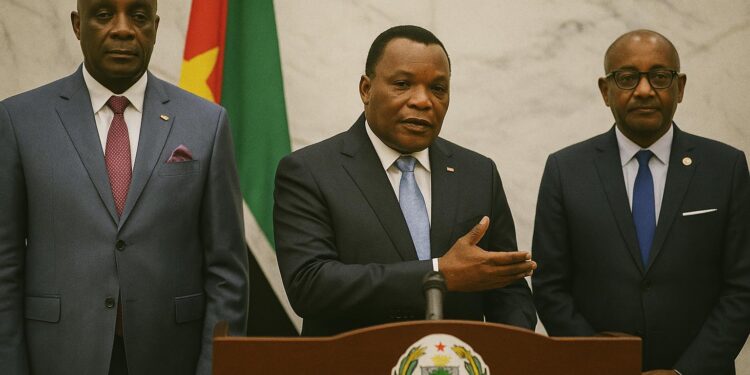Southern African stopovers reshape the race
The corridors of Maputo’s Joaquim Chissano Conference Centre had barely quieted after Jean-Claude Gakosso’s meetings with Mozambican officials before the Congolese Foreign Minister and his delegation boarded a late-night flight to Gaborone. By 24 July 2025 the Botswanan capital became the latest focal point of a meticulously sequenced tour designed to secure regional endorsements for Firmin Édouard Matoko, Brazzaville’s candidate for the post of Director-General of the United Nations Educational, Scientific and Cultural Organization. According to diplomatic communiqués issued in Maputo and Gaborone, discussions were “cordial and forward-looking,” underscoring growing consensus that the time is ripe for an African to steer the Paris-based agency (Botswana Ministry of Foreign Affairs communiqué, July 2025).
A technocrat steeped in multilateral culture
Matoko’s résumé is difficult to dismiss. A veteran of UNESCO since the mid-1990s, he currently holds the portfolio of Assistant Director-General in charge of Priority Africa and External Relations. In that role he has overseen the General History of Africa project, championed open-science protocols adopted in 2021, and steered the preparation of the forthcoming Global Convention on Higher Education. UNESCO’s own biographical note emphasises that he is “among the most seasoned field operators” in the organisation (UNESCO personnel file, 2024). Supporters argue that such institutional memory could prove decisive in navigating budgetary constraints and in counterbalancing centrifugal geopolitical pressures now weighing on the agency.
Pan-African momentum built on shared narratives
Congo-Brazzaville’s pitch deliberately transcends national boundaries. Minister Gakosso’s talking points, echoed in press briefings from Harare to Windhoek, frame Matoko’s candidacy as an exercise in collaborative continental agency, a diplomatic shift “from speaking about Africa to speaking with Africa.” The slogan resonates with policymakers who recall that no sub-Saharan African has led UNESCO since the organisation’s creation in 1945. Analysts at the South African Institute of International Affairs note that Pretoria, Luanda and Addis Ababa have all signalled preliminary sympathy for the bid, though formal pledges will materialise only once the African Union’s ministerial committee convenes later this year (SAIIA memo, June 2025).
Presidential imprimatur and Brazzaville’s soft power
The campaign is unmistakably anchored in the foreign-policy doctrine articulated by President Denis Sassou Nguesso, which privileges consensus-building and cultural diplomacy. Congolese envoys stress that Brazzaville’s mediation in regional peace initiatives—from the Central African Republic to Libya—gives the country credibility to advocate a leadership style grounded in dialogue. Critics who once described Congo as “punching above its weight” now acknowledge that the republic has honed an ability to convene, an attribute that multilateral agencies often prize.
Symbolic gestures entwined with historical memory
Beyond formal meetings, Gakosso has woven commemorative moments into the itinerary. At Maputo’s Praça dos Heróis he laid a wreath at the mausoleum of Samora Machel, invoking the legacy of liberation movements that inspired UNESCO’s pioneering General History of Africa volumes. The gesture, advisers contend, situates Matoko’s platform in a continuum linking historical emancipation to contemporary intellectual sovereignty—a narrative that finds particular resonance among Lusophone nations emerging from anti-colonial struggles.
Next on the circuit: islands and economic hubs
The Mozambican and Botswanan chapters represent only the opening phase of a choreography expected to unfold across at least nine additional capitals. Mauritius will host the next round of consultations before Prime Minister Anatole Collinet Makosso assumes stewardship of the campaign in West and East Africa. Government sources in Brazzaville confirm planned stops in Abidjan, Abuja, Monrovia and Djibouti, each selected for its voting weight within UNESCO’s Executive Board or its capacity to amplify diplomatic messaging within regional blocs.
Inside UNESCO’s electoral arithmetic
Winning the Director-Generalship requires a simple majority of the 58-member Executive Board, followed by confirmation in the 193-member General Conference. At present at least five candidatures are anticipated, including names circulating from Latin America and the Asia-Pacific. Observers at the Paris headquarters suggest that a cohesive African endorsement could effectively place Matoko in the final ballot. A senior UNESCO official familiar with the process concedes that “fragmentation has historically handicapped African hopefuls; a unified front would be game-changing.”
Strategic implications for multilateral governance
Should the bid succeed, it would calibrate UNESCO’s leadership toward priorities long articulated by African states—expansion of technical vocational education, restitution of cultural artefacts, and digital capacity-building in the Sahel. It would also illustrate the viability of mid-sized nations such as Congo-Brazzaville to marshal continent-wide coalitions. For global partners, the episode serves as a barometer of the broader rebalancing underway within the United Nations system, in which demographic heft and geopolitical pluralism increasingly challenge post-war hierarchies.
A measured yet confident conclusion
As the Southern African leg of the campaign draws to a close, Congo-Brazzaville has demonstrated organisational rigour and narrative coherence. Whether these virtues translate into electoral arithmetic at UNESCO will become clear only in October 2025. For now, the image of Minister Gakosso moving seamlessly from Maputo’s coastal humidity to Gaborone’s semi-arid skyline captures a larger continental ambition: to ensure that Africa is no longer the object but the architect of twenty-first-century multilateralism.











































